The Indore Bench of the Madhya Pradesh High Court has imposed exemplary cost of Rs. 2 lakh on the State Bank of India (SBI) for adopting a very 'inhuman approach' while dealing with a widow woman's application seeking appointment to the Bank on compassionate grounds. The cost is made payable to the woman (Petitioner)."I have never come across any such case in which, such a harsh approach has...

